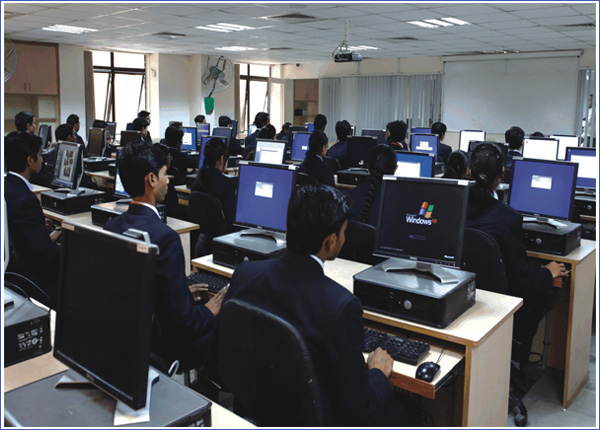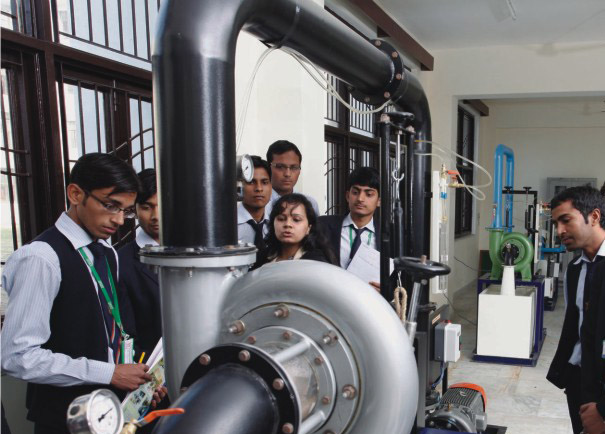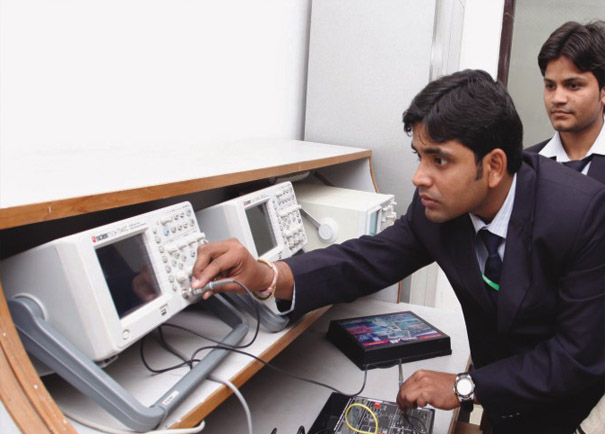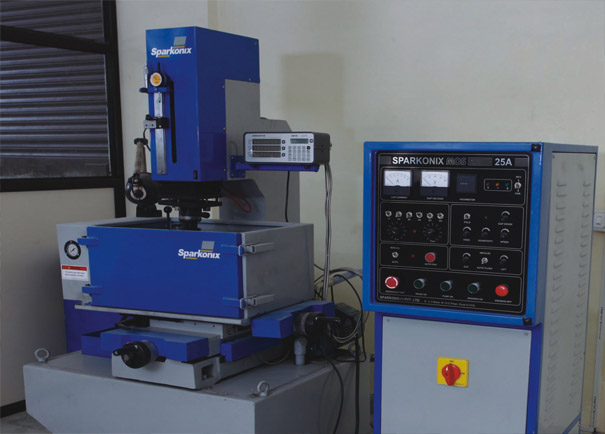M.Tech (Computer Science & Engineering)
- Course Type : Post Graduation
- Duration : 2 years (4 semesters)
- Department : Department of Computer Science
- Approvals : AICTE
About the Programme
Department of Computer Science and Engineering has started this PG Program in the year 2010. The program is approved by AICTE and affiliated to UPTU. In the current scenario of various computing devices, the importance of efficient computing with resource optimization is becoming more and more relevant. The need for advancements in architecture and integrating computer hardware, software, algorithms, data management, simulation etc., is being increasingly felt. It is in this context this program assumes relevance.
The curriculum is aimed to give theoretical and hands on in the areas of Advances in Operating Systems, Advances in DBMS, Computer Systems Performance Analysis, Formal Models in Computer Science, Advanced Algorithms, Advances in Computer Architecture, Computer Networks, Optical Networks, Advances in VLSI in the first three semesters and a host of elective subjects like Advances in Digital Image Processing, Computer Graphics & Visualization, Topics in Artificial Intelligence, Protocols Engineering, Advances in Storage Area Networks, Advances in Compiler Design, Information Security etc. Students have opportunity to work in advanced areas like Data warehouse, data mining as the department has projects funded by Government agencies and companies like Wipro.
Computer Science & Engineering
Computer Systems have become a way of life in modern day to day activities. Professionals in diverse fields are increasingly adopting the use of Computer Science to enhance productivity and effectiveness in their organizations to meet the challenges of digital age. Today's technological advancements require technology professionals who can help companies to administer their system networks and databases. More importantly these companies need professionals to help their computer users to do their job without having to know how the internals of computers work.
The department faculty prepares students to be those technology professionals who can help to administer computer systems, manage networks of computers, design and develop Web pages, troubleshoot network security problems, and oversee the physical connectivity of internet or intranet connections.
One of the strengths of department of computer science and information technology is the fact that it offers small size classes in a computer laboratory that provides an interactive approach to learning programming concepts.
Department of Computer Science & Engineering has following well-equipped labs

- Computer Programming Lab
- Computer Graphics Lab
- Data Structure Lab
- Computer Networks Lab
- Software Engineering Lab
- Mini Project Lab
- Discrete Structures Lab
- Web Technology Lab
- Data Base Management Systems Lab
- Numerical Techniques
- Distributed Systems Lab
- OOPS with C++ Lab
- Artificial Intelligence Lab
- Theory of Computation Lab
- Digital Image Processing Lab
- Compiler Design Lab
- Software Project Management Lab
- Object Oriented Techniques Lab
- Operating Systems Lab
- Project Lab
Department of Mechanical Engineering
Mechanical is the core branch of engineering, so the scope and job market is evergreen. The Department of Mechanical Engineering is dedicated to educat the next generation of engineers who move on to become leaders in their professions. B. Tech in Mechanical Engineering at JP offers strong foundations in mathematics and science, vital research & design experience and opportunities to develop leadership skills. We prepare our students to be globally competitive. On one hand, it provides the basic working knowledge of the production and properties of different material used in the industry, on the other hand, it explains the use of different tools, equipments, machinery and techniques of manufacturing, which ultimately facilitate shaping of these materials into various usable forms. Thus it not only provides a good theoretical background but also gives a sound practical outlook to a student working in various industries like carpentry fitting, welding, black smithy, sheet metal, machine & foundry shops.
Thus to train Mechanical Engineer in the planning, design, operation, management and maintenance related to assemble and the use of machines and other mechanical equipments & devices, the department has following well set laboratories:
Department of mechanical Engineering has following well-equipped laboratories

- Engineering Mechanics Lab
- Workshop Lab
- Thermodynamics Lab
- Measurement & Instrumentations Lab
- Machine Drawing - II Lab
- Heat and Mar transfer Lab
- Automobile & I/C Engine Lab
- Machine Design - II Lab
- Computer Aided Drawing Lab
- Fluid Mechanics Lab
- Material Science & testing Lab
- Machine Drawing - I Lab
- Fluid Machinery Lab
- Refrigeration & Air Conditioning Lab
- Machine Design - I Lab
Department OF Electronics & Communication Engineering
The major force for the present day Information Technology revolution is the development in Electronics Engineering. Penetration of electronics has now revolutionized other areas like health care, instrumentation, automation, remote sensing, signal processing etc. Knowledge of computer hardware, networking equipments and communication systems enables electronics engineering graduate to annex an edge in the IT job market. The skills and understanding developed in the course enable them to be preferred, as software professionals by IT companies. The department encourages students to work on projects in thirst areas that includes Robotics, Image Processing, Microcontroller based projects.
Electronic Engineers have opportunities in Government and Private companies for installation, operation and maintenance of electronics equipment and systems. Defense, space and other large research organizations employ electronics engineers in design and development of complex devices and systems for signal processing and telecommunication. Industries involved in design and fabrication of devices, integrated circuits, embedded systems, electronic equipments etc have also provided large scale placements for engineers with this specialization.
Installation and maintenance of electronic equipment used for health care in hospitals, equipment & systems for instrumentation and control in process industries automation systems of assembly line in production industries, etc are also handled by electronics engineers.
Department of electronics has following well-equipped laboratories

- Microprocessor & Micro Controller Lab
- A.I.C. Lab
- Microwave & Optical Lab
- Electronics Engineering Lab
- Electronic Workshop & PCB Lab
- Electronics Measuring Lab
- Energy Conversion Lab
- Electronic Devices Lab
- Transducer and Telemetry Lab
- Control Systems Lab
- Electronics CAD Lab
- Electronics Lab
- Network Lab
- Digital Electronics Lab
- PCB Lab
Department of civil Engineering
Civil Engineering is the oldest branch of engineering which is growing right from the stone age of civilization. It is considered as the first discipline of the various branches of engineering after Military Engineering.
Civil Engineering includes the designing, planning, construction, and maintenance of the infrastructure. Civil Engineers have vast scope as their work involve roads, bridges, buildings, dams, canals, water supply and numerous other facilities that affect the life of human beings. Civil Engineering is intimately associated with the private and public sectors, including the individual homeowners and international enterprises.
For a Civil Engineer, materials form the basis of what an engineer do, understanding material properties can help them make design decisions. To equip the graduates with answer to such practical question and the department of Civil Engineering has following under mentioned labs.
Department of civil Engineering has following well-equipped laboratories

- Building Materials Lab
- Building Planning & Drawing
- CAD Lab (Civil Engineering)
- CBNST Lab
- Hydraulics & Machine Lab
- Geo-Informatics Lab
- Energy Conversion Lab
- Structural Detailing Lab
- Structural Analysis Lab
- Transportation Lab
- Environmental Engineering Lab
- Fluid Mechanics Lab
- Geotechnical Engineering Lab
- Surveying Lab
MCA (Master of Computer Application)
| Affiliated to : | Uttar Pradesh Technical University, Lucknow. |
| Approved by : | A.I.C.T.E.. MHRD, Govt. of India |
| Duration : | 3 Years, Full-time Program |
About the Programme:
The success of the CSE/IT/MCA Department is attributed to its motivating and inspiring faculty members. Our faculty members are expert professional educators. They are specialists in their fields.
At JPIET faculty members are committed to student achievement. They invest one-on-one time to identify talents and nurture abilities of students.Their personalized approach often results in success never initially imagined by students.
Faculties treats students as their children and is always ready to provide support in terms of educational guidance and morale support. Weak Students are identified and are given especial attention and extra time for improving on their weakness.
We time to time conduct faculty development program in our department which supports the professional development needs of faculty. Particular attention is paid to activities which may directly improve teaching, learning, assessment and the quality of the student experience.
The faculty members at JPIET handle subjects like Distributed Systems, Design and Analysis of Algorithms, Computer Orgnization, Computer Networks, Mobile Computing along with latest languages and much more. The students gain high quality learning in subjects.
It is our constant endeavour to improve the quality of the students experience by assuring the continuous learning and development of academic staff.
We disseminate good practice in teaching, learning and assessment as identified through internal evaluation processes and quality assessment mechanisms.
Eligibility:
Applicant should have a minimum of three year bachelor's degree or equivalent in any discipline with an aggregate of 50% marks recognized by Association of Indian Universities (AIU).
Candidate must have mathematics as one of the subject at 10+2 or at graduation level.
Candidates appearing for the final year's Examination for the bachelor degree can also apply.
2 Years - Lateral Entry
Recognized Bachelor's Degree of Minimum 3 years duration in Computer Applications, IT and Computer Science (BCA, B.Sc - IT/Computer Science) with Mathematics as a course at 10+2 level or at Graduation level. The candidate must have obtained at least 50% (45% in case of candidate belonging to reserved category) in the qualifying examinations.
MBA (Master of Business Administration)
About the Programme:
Master of Business Administration or MBA is one of the most popular post-graduate programmes in India and abroad. The two-year programme is a gateway to a plethora of job opportunities in the corporate world. Here are some important facts about the MBA program:
- What makes MBA such a popular course is that students from any background - including Science, Commerce and Humanities - can pursue it.
- A regular MBA or Post-Graduation Diploma in Management (PGDM) is generally a two-year course divided into four or six semesters. However, there are certain private institutes that offer one-year PGDM programmes as well.
- One can pursue MBA in various modes, such as, Regular, Online and Distance-Education. Interested candidates can also find programmes customised based on their professional experience such as Executive MBA.
- Many management institutes offer Post-Graduate Diploma (PGD) or Post-Graduate Programme (PGP) in Management instead of an MBA degree. There is not much difference between the two, but for their titles.
- The full-time MBA is the most popular among all, and includes theory classes, practical projects, and internships.
- Fresh graduates as well as candidates with a few years of work experience opt for a full-time MBA. Some colleges prefer fresh graduates while some colleges give higher preference to candidates with a few years of work experience.
- On the other hand, the Executive MBA is fit for candidates with more than 5 -10 years work experience as it is designed to enhance their managerial and leadership skills to stay relevant in the job market.
- Online MBA, Part Time MBA and Distance MBA programmes are ideal for candidates who wish to study while working.
MBA eligibility
Full-time MBA eligibility criteria are as follows:
- The basic eligibility criteria for MBA (full-time) is Graduation in any discipline or equivalent from a recognised university
- Most of the institutes follow the minimum score criteria in Graduation which is 50 per cent in average or equivalent. For Reserved category students, the minimum score in 45 per cent in aggregate
- Final-year Graduation candidates are also eligible to apply for MBA, provided they present the proof of completion of Graduation degree within the duration specified by the institute
MBA Admissions
Admissions to all B-schools typically take place through an admission test. This test can be one of the following types:
- National Level Test conducted by an apex testing body or a top national B-school on behalf of the other participating colleges. eg: CAT, MAT, CMAT or ATMA
- State Level Test conducted by a state level testing body or a top state B-school on behalf of the other participating colleges in that state. eg: MAH-CET, OJEE, KMAT, TANCET or APICET
- Test conducted by a B-school for entrance to its own MBA programme. In some cases, these scores can be accepted as a qualifying criteria by other B-schools as well. eg: IIFT, XAT, NMAT, SNAP, IBSAT
- Test conducted by a university for entrance to MBA programmes being offered by colleges that are affiliated to it. eg: KIITEE, HPU MAT
Top MBA entrance exams
Given below is the list of top MBA exams scores that are valid for admission to various B-schools
| CAT | XAT |
| CMAT | MAT |
| SNAP | NMAT |
Popular MBA Specializations
| MBA Finance | MBA Marketing |
| MBA IT | MBA HR |
Department of Applied Science
The Department of Applied Science engages the students in their first year and builds their foundation provide base for the engineering knowledge of their respective disciplines.
Applied Physics provides a sound science base for all engineering students in their I & II Year.
Applied chemistry has contributed significantly to engineering fields like polymer technology, material science, industrial waste management etc.
Applied mathematics is all pervasive and no field of engineering is complete without it. Students are therefore given a thorough grounding in mathematics during first year and advanced subjects in subsequent years. Environment Science develop skills for tackling various Environmental problems through resources management & conservation and pollution monitoring & control.
On the whole, the students in the first year are trained to explore, to innovate, to analyze and to acquaint themselves with the applications of basic sciences in engineering and technological areas.
The practical work forms the backbone of technical education, to suffice this purpose the department is equipped with well set, furnished, spacious and ventilated Laboratories.
The department also sharpens their skills in communication and introduces them to the essentials of communication and business communication as required by a practicing engineer or an entrepreneur.
The department has highly qualified, experienced and dedicated faculties, who help in creating an exciting academic and research oriented environment.
Welcome to JPIHM Diploma In Engineering!
Diploma In Engineering came into being in the year 2009 for the purpose of meeting the ever growing demand of Techno-Engineers for Industries in India and abroad. The ever expanding global market and open gates of world economy have opened up new vistas of job-opportunities for well trained engineers in almost all the fields of engineering branches. The students, girls as well as boys, preferred choice after passing class X is to go for Engineering. The lack of accredited colleges of Diploma motivated the JP Educational Trust Society to open JPIHM Diploma In Engineering.